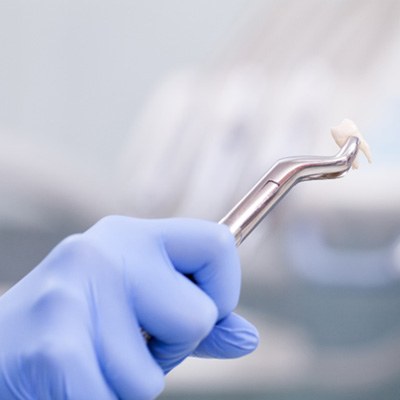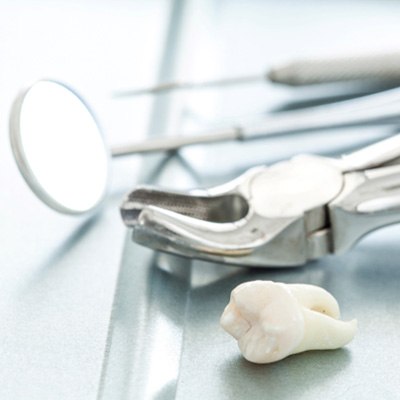Tooth Extractions – Chesapeake, VA
When a Tooth Can’t Be Saved

Whenever you have a dental emergency that involves an injured or infected tooth, we will consider all of the possible treatment options for keeping your natural smile intact. In some cases, though, having a tooth removed might ultimately be the best choice for your oral health in the long run. Dr. Troisi will always put your comfort first when removing your tooth, and she can help you take steps to have it replaced as quickly as possible. Call us today to learn more about tooth extractions from our Chesapeake, VA emergency dentist if you think you have a tooth that needs to be taken out.
Why Choose Troisi Dentistry For Tooth Extraction?
- Same-Day Emergency Appointments
- Relaxing Nitrous Oxide Sedation
- In-House Dental Implant Placement
Reasons Why Tooth Extractions Are Necessary

A tooth extraction is never our first choice. We’ll only recommend it after we’ve first considered other restorative treatments that could be used to save the tooth. An extraction might be necessary for one of the following situations:
- The tooth is badly decayed or severely damaged and can't be fixed with a filling or crown.
- There is an infection that might spread to your other teeth if it isn't treated.
- You are suffering from advanced gum disease that has caused one or more of your teeth to become loose.
- You are planning to have orthodontic treatment performed, but your teeth are too crowded together for the necessary movements to be made.
- For children, there may be a baby tooth that has not fallen out when it was supposed to.
The Process of Removing a Tooth

Tooth extractions are either simple or surgical. Simple extractions are performed when the tooth is completely visible above the gumline. After numbing your mouth, we can gently rock the tooth back and forth with forceps, slowly loosening it until it can be removed.
Teeth that are impacted or not fully above the gumline might require surgery. This involves making a small opening in the gums to access more of the tooth. Surgical extractions might require dividing the tooth into sections so that it can be taken out of the mouth safely.
We’ll determine what type of extraction is right for you during your initial consultation. Our team will walk you through the extraction process and answer any questions so that you know exactly what to expect moving forward.
Tooth Extraction Aftercare

To make sure that your mouth heals properly after tooth extraction, you should follow these tips:
- Take any prescribed pain medications according to the directions you were given. It's often best to take the medication before the numbness in your mouth wears off.
- Brush and floss around the extraction site carefully to keep it clean.
- Drink plenty of water; staying hydrated is essential for the healing process.
- If there's any swelling, apply an ice pack or cold compress to the outside of your mouth over the affected area.
- Maintain a diet of soft foods for a while. Stay away from anything sticky, sour, or spicy until you've made a full recovery.
Understanding the Cost of Tooth Extractions

It’s crucial to take great care of your natural teeth as an adult; you only get one set, after all. Whether it’s from insufficient oral hygiene, overcrowding, an accident, or another reason, sometimes a person will need their tooth extracted in the best interest of their oral health. If your emergency dentist in Chesapeake has suggested this for you, it’s understandable if your mind wanders to the cost of tooth extractions. The truth is, it comes down to your specific case. To learn more about what affects the price, read on or contact our team!
Factors That Can Affect Tooth Extraction Cost
Our team needs to assess your dental situation before we can provide you with pricing for a tooth extraction. The cost could be influenced by:
- What type of tooth is it? Where is it located? Is it a single extraction or several teeth?
- How difficult will the extraction be? Does a specialist need to be involved?
- What is the plan to replace the extracted tooth – dental implant, bridge, etc.?
Does Dental Insurance Cover Tooth Extractions?
It is common for dental insurance to cover about half the cost of a tooth extraction after the deductible has been met. This includes wisdom teeth, which is good since an impacted extraction is a more substantial procedure than a simple extraction. But there may be a limit on the number of teeth covered or a waiting period before the coverage takes effect.
Since every plan is different, you need to confirm the details with your insurance company. Our team will happily help you with this step!
Other Options for Making Tooth Extractions Affordable
If you don’t have dental insurance, we can still help you out! Here are some other avenues to affording the care you need:
- CareCredit financing – if you can’t pay for treatment upfront, you can pre-apply for a CareCredit plan that suits your financial situation. We can answer your financing questions; just ask.
- In-house membership plan – Even if you don’t have insurance, you can still get dental services at a reduced rate. In many ways, a membership is simpler than insurance because there are no deductibles, annual maximums, or other concerns. Call us for details.
Dr. Troisi is ready to assist with your extraction, and our team members can help you navigate the financial aspects. If your oral health could benefit from an extraction, contact us today!
Tooth Extractions FAQs

By now, you may be considering tooth extractions in Chesapeake. These treatments, after all, can significantly improve your long-term oral health! Still, it’d be wise for you to know some basic extraction facts first. Pulling a tooth should be a last resort, so that’s only natural. Thankfully, we at Troisi Dentistry are here to help: listed below are some frequently asked extraction questions. Please read them over to learn how your procedure would work. Otherwise, call our office or book a consultation for more details!
Is There an Alternative to a Tooth Extraction?
A dentist will always try to save your natural teeth when possible. That said, whether you have options besides an extraction will depend on your situation.
For example, imagine that your problem tooth is highly decayed. In that case, root canal therapy might be a good alternative. The procedure would remove the decaying or infected tissue and preserve your pearly white.
On the other hand, one of your teeth might be loose due to gum disease. If so, a dentist could perform root scaling and planing instead of extraction.
Remember, our team will only recommend extraction as a last resort. We’d only perform one when it would truly restore your smile and bite.
What’s the Difference Between Tooth Extractions and Wisdom Tooth Surgery?
True enough, tooth extraction and wisdom tooth surgery both involve pulling teeth. However, they’re different procedures with distinct goals and methods.
For one thing, these procedures don’t remove the same types of teeth. Wisdom tooth surgery focuses on the third molar, while extraction works on any tooth that’s highly damaged or causing overcrowding.
Furthermore, pulling wisdom teeth is often surgical in ways that a standard extraction isn’t. The former may require a dentist to make incisions into your gums. The latter, meanwhile, is usually “simple” and only requires some forceps.
Can I Leave the Space Empty After a Tooth Extraction?
Technically, you can leave the space from a tooth extraction empty. (A dentist can’t force you to get restoration work, after all.) Even so, however, doing so isn’t a good idea.
You see, teeth do more than give you a full smile. You also need them to chew food properly and enunciate words. Without a full set, then, it’s easy to suffer from malnutrition and speech impediments. Those issues, in turn, will lower your quality of life.
Given these facts, most dentists recommend tooth-replacement treatment after extraction. Once you’ve healed from the latter, they’ll suggest possible restorative options that could work for you.
What Can I Do to Speed Up the Healing Time?
Following a tooth extraction, you’ll need some time to heal. Thankfully, though, there are ways to speed up that recovery process. Some examples include:
- Avoid strenuous exercise for the first 24 hours post-extraction.
- Keep the provided gauze in place as instructed by the dentist.
- To prevent a dry socket, stay hydrated while not using a straw.
- Reduce swelling or puffiness with a cold compress.
- Only use pain medications recommended by the dentist. (Some, like aspirin, may delay the formation of a blood clot.)
I Need a Checkup & Cleaning I Need a Dentist for My Child I am Concerned About Bleeding Gums I Have a Cavity or Broken Tooth I am Missing One or More Teeth I Want to Enhance My Smile I Want a Straighter Smile I am Scared of the Dentist I am in Pain & Need Help I Need My Wisdom Teeth Removed I Have Pain in My Jaw View Our Services
